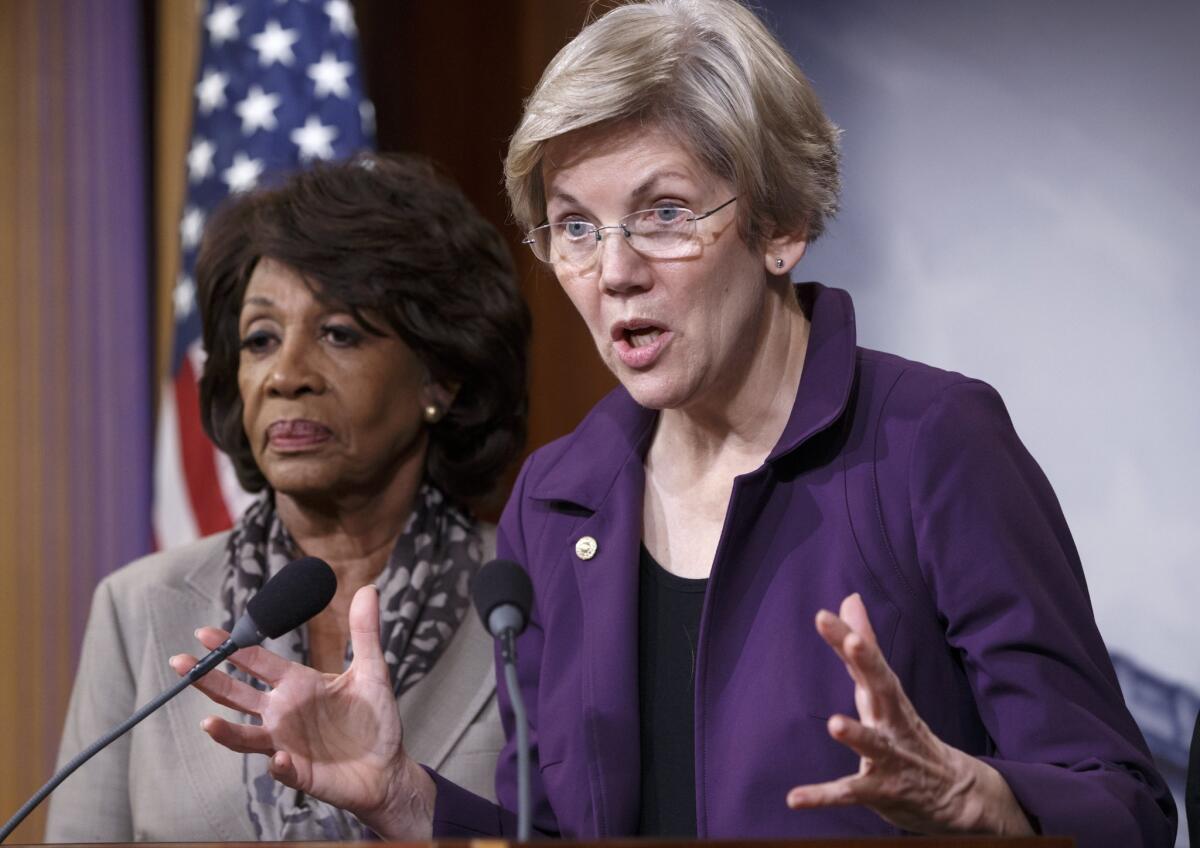Opinion: In spending-bill battle, Obama and banks prevail over Pelosi, Warren

- Share via
So much for the new populism.
Prodded by Sen. Elizabeth Warren, a freshman Democrat from Massachusetts who’s been a sharp critic of Wall Street, House Democrats tried to derail the White House-supported omnibus spending bill this week because it would let banks make riskier investments with insured deposits and fat-cat donors write much bigger checks to political parties. Their protest coincided with a similar effort by Republicans aligned with the tea-party movement, who wanted to use the measure to repeal President Obama’s latest order on deportations.
The revolt proved fruitless, as the House passed the bill Thursday night without amendment. Almost 70% of the House GOP caucus lined up behind the bill, as did a sizable block of Democrats. The Senate was expected to pass the measure as soon as Friday.
The episode was a taste of things to come in the next two years, when Republicans control both chambers of Congress. The GOP is eager to reverse many of the policies championed by the Obama administration, including the tougher banking rules enacted in the 2010 Dodd-Frank law. But the split between the mainstream and tea-party wings of the GOP will provide openings for Democrats to force compromises, and that’s exactly what happened on the omnibus spending bill.
For example, in exchange for rolling back many of the restrictions on derivatives trading with insured deposits that Congress has enacted in Dodd-Frank, Democrats won increases in the budgets for the enforcement agencies that oversee derivatives and other securities. They also shielded another Dodd-Frank initiative targeted by the GOP, the Consumer Finance Protection Bureau.
The derivatives rules were especially vulnerable to challenge, considering that more than a third of House Democrats and virtually every House Republican had voted for a bill last year to roll back the rules. Many top bank regulators had opposed the restrictions before they were enacted, arguing that banks would simply shift the trades to less regulated subsidiaries. In a concession to Dodd-Frank’s proponents, though, the bill leaves in place tough restrictions on “structured finance swaps,” the particularly risky securities that helped cause giant insurer American International Group to collapse.
That’s not to say it’s good policy to let banks bet insured deposits on derivatives. And it’s certainly a bad idea to adopt important new legislative policies through the shortcut of a spending bill. It’s just to note that the derivatives provision didn’t come completely out of the blue, nor did it represent an extremist position taken by party ideologues.
Still, you might think that Warren’s exortations against another Wall Street “bailout” might have resonated well enough with Democrats to persuade them to topple the “CROmnibus,” as the combined continuing resolution (for the Department of Homeland Security, which expires early next year) and omnibus appropriations bill (for the rest of the federal government) was called. And if that wasn’t enough, they had Minority Leader Nancy Pelosi urging them to vote against the bill to show House Republicans and the White House that they can’t be ignored.
At the end of the day, though, 57 Democrats ignored those ministrations and voted yes. Some saw the measure as an honest-to-goodness compromise with no need for further concessions, considering the good things in the bill as well as the bad ones. And others, including House Minority Whip Steny H. Hoyer (D-Md.), made the entirely rational decision that the deal on the table was certainly better than any that Republicans would offer next year, when they will control both houses of Congress.
They’re probably right about that, but a lot depends on whether House Republicans find a way to unite behind a common set of goals. As long as House Speaker John A. Boehner (R-Ohio) can’t pass a major bill without the Democrats’ help, the door to compromise will be open. If he can count on the support of his tea-party flank, however, the only Democrats Boehner will have to negotiate with will be in the Senate and the White House.
Then Pelosi may really feel ignored.
Follow Healey’s intermittent Twitter feed: @jcahealey
More to Read
Sign up for Essential California
The most important California stories and recommendations in your inbox every morning.
You may occasionally receive promotional content from the Los Angeles Times.














